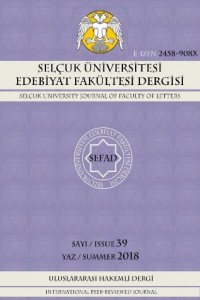Öz
Of Human Bondage (1915) by Somerset Maugham might be considered to be the story of a boy’s rite of passage, of a troubled love affair or to have a touch of Maugham’s own growth from boyhood to adulthood. However, the novel exceeds these simplistic approaches, touching upon the most intriguing questions of the human condition: the triggering principles of human actions and the question of free will. In this questioning, Maugham’s main philosophical inspiration is Baruch Spinoza (1632-1677) and he borrows the title of his book from Spinoza’s magnum opus, Ethics (1677) in which “Of Human Bondage” is the title of an episode. In his Ethics, Spinoza defines the concept of bondage as man’s inability to have full control over his actions and thoughts and he suggests that even though a human being has the knowledge of good and evil, certain faculties of human nature might lead to false knowledge or imperfection in his/her actions. The novel’s protagonist, Philip, who struggles with this bondage that surrounds him like an alien power that comes from within, as Maugham describes it, becomes the object of this discussion of human freedom or imprisonment carried out by Spinoza and other seventeenth and eighteenth century philosophers such as Francis Bacon, Thomas Hobbes and David Hume. Thus, the aim of this paper is to discuss the issue of the ‘inescapable’ bondage of man and the possibility of free will as embodied in Maugham’s Of Human Bondage.
Anahtar Kelimeler
The question of free will Of Human Bondage Somerset Maugham Benedict de Spinoza determinism
Kaynakça
- Bergson, Henri (1922). Creative Evolution. London: Macmillan and Co.
- Cordell, R. A. (1937). W. Somerset Maugham. London and New York: Thomas Nelson and Sons.
- Cordell, R. A. (1956). “Introduction”. Of Human Bondage. New York: Modern Library Paperbacks. 5-20.
- Curtis, A. - Whitehead, J. (2003). “Introduction”. The Critical Heritage: W. Somerset Maugham. London and New York: Routledge. 1-18.
- Dilman, İlham (2001). Free Will: An Historical and Philosophical Introduction. London and New York: Routledge.
- Gillespıe, Michael Allen (2008). The Theological Origins of Modernity. Chicago and London: University of Chicago Press.
- Hume, David (2007). An Enquiry Concerning Human Understanding. Oxford: Oxford University Press.
- Maugham, Somerset (1951). The Summing Up. New York: Mentor Books.
- Maugham, Somerset (1956). Of Human Bondage. New York: Modern Library Paperbacks.
- Ramon, Fernando Huesca (2015). “Hegel’s Concept of the Free Will: Towards a Redefinition of an Old Question”. Journal of Cognition and Neurotics 3 (1): 309-325.
- Ross, Woodburn O. (1946). “W. Somerset Maugham: Theme and Variations”. College English 8 (3): 113-122.
- Spencer, Theodore (1940). “Somerset Maugham”. College English 2 (1): 1-10.
- Spinoza, Baruch (1994). A Spinoza Reader: Ethics and Other Works. ed. trans. Edwin Curley. New Jersey: Princeton University Press. SEFAD
Öz
Somerset Maugham’ın Of Human Bondage (1915) adlı romanı bir bireyin çocukluktan erişkinliğe geçişinin hikayesi, sorunlu bir aşk hikayesi ya da Maugham’ın kendi hayatının bir yansıması olarak okunabilir. Ancak roman bu yaklaşımların çok ötesine geçerek, aslında insan var oluşunun en tartışmalı sorunlarından birisine dokunmaktadır: insanın eylemlerinin kökeni ve özgür irade sorunsalı. Bu sorgulama sürecinde Maugham’ın en önemli felsefi ilham kaynağı Baruch Spinoza’dır (1632-1677). Öyle ki romanın başlığı aynı zamanda Spinoza’nın en bilinen eseri olan Etika adlı metninin bölümlerinden birisinin başlığıdır. Bu eserinde Spinoza insanın esareti kavramını bir kişinin kendi davranışları ve düşünceleri üzerinde kontrol sahibi olamaması olarak tanımlar ve kişinin doğru ve yanlış kavramlarının bilincinde olmasına rağmen insan doğasına içkin olan bazı etkiler sebebiyle doğru davranışı sergileyemeyebileceğini söyler. Maugham’ın romanının başkarakteri Philip, Spinoza’nın tanımladığı bu esaretin pençesinde mücadele eden bir birey olarak karşımıza çıkar ve bu anlamda da özgür iradenin mümkün olup olmadığı tartışmasının da merkezine yerleşir. Bu bağlamda, bu makalenin amacı Spinoza ve Hobbes, Hume ve Bacon gibi birçok düşünür tarafından tartışılmış olan özgür irade ya da insanın “kaçınılmaz” esareti sorununu Maugham’ın bakış açısından irdelemektir.
Anahtar Kelimeler
Özgür irade sorunsalı Of Human Bondage Somerset Maugham Benedict de Spinoza belirlenimcilik
Kaynakça
- Bergson, Henri (1922). Creative Evolution. London: Macmillan and Co.
- Cordell, R. A. (1937). W. Somerset Maugham. London and New York: Thomas Nelson and Sons.
- Cordell, R. A. (1956). “Introduction”. Of Human Bondage. New York: Modern Library Paperbacks. 5-20.
- Curtis, A. - Whitehead, J. (2003). “Introduction”. The Critical Heritage: W. Somerset Maugham. London and New York: Routledge. 1-18.
- Dilman, İlham (2001). Free Will: An Historical and Philosophical Introduction. London and New York: Routledge.
- Gillespıe, Michael Allen (2008). The Theological Origins of Modernity. Chicago and London: University of Chicago Press.
- Hume, David (2007). An Enquiry Concerning Human Understanding. Oxford: Oxford University Press.
- Maugham, Somerset (1951). The Summing Up. New York: Mentor Books.
- Maugham, Somerset (1956). Of Human Bondage. New York: Modern Library Paperbacks.
- Ramon, Fernando Huesca (2015). “Hegel’s Concept of the Free Will: Towards a Redefinition of an Old Question”. Journal of Cognition and Neurotics 3 (1): 309-325.
- Ross, Woodburn O. (1946). “W. Somerset Maugham: Theme and Variations”. College English 8 (3): 113-122.
- Spencer, Theodore (1940). “Somerset Maugham”. College English 2 (1): 1-10.
- Spinoza, Baruch (1994). A Spinoza Reader: Ethics and Other Works. ed. trans. Edwin Curley. New Jersey: Princeton University Press. SEFAD
Ayrıntılar
| Birincil Dil | İngilizce |
|---|---|
| Bölüm | Makaleler |
| Yazarlar | |
| Yayımlanma Tarihi | 22 Haziran 2018 |
| Gönderilme Tarihi | 13 Şubat 2018 |
| Yayımlandığı Sayı | Yıl 2018 Sayı: 39 |
Selcuk University Journal of Faculty of Letters will start accepting articles for 2025 issues on Dergipark as of September 15, 2024.


